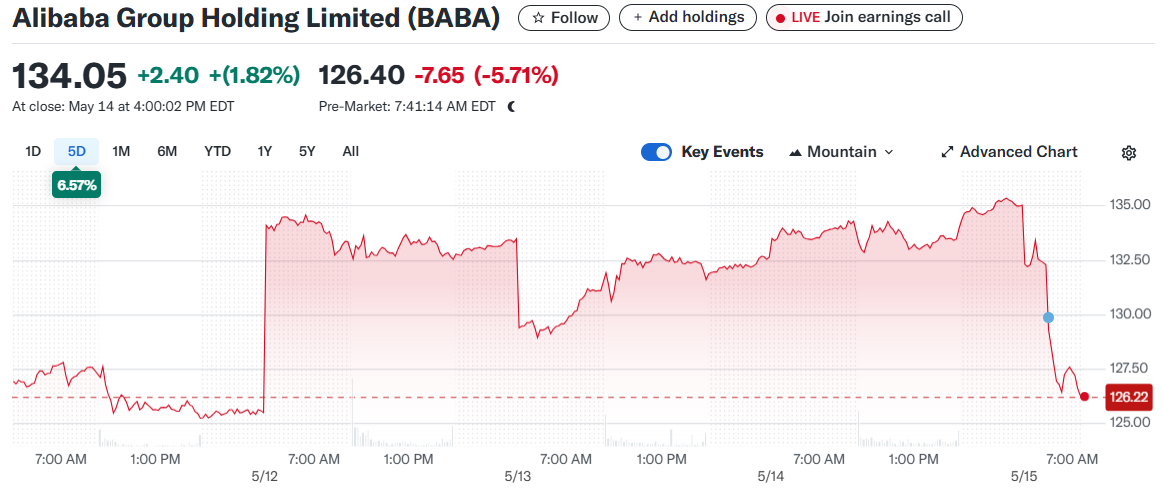TLDR:
- Alibaba’s Q4 profit came in at 12.4 billion yuan, far below the expected 24.7 billion yuan
- Revenue grew 7% year-over-year but still missed analyst targets
- Shares dropped 5% in premarket trading following the announcement
- Cloud division showed strong 18% growth compared to last year
- Company reported “triple-digit growth” in AI-related products for seventh consecutive quarter
Chinese tech powerhouse Alibaba saw its shares drop Thursday following a disappointing earnings report that missed analyst expectations by a wide margin. The company’s fiscal fourth quarter results revealed that profitability fell well below market forecasts, despite modest revenue growth.
The e-commerce behemoth reported net income of 12.4 billion yuan ($1.71 billion), less than half of the 24.7 billion yuan analysts had expected. Revenue reached 236.5 billion yuan ($32.6 billion), just shy of the 237.2 billion yuan forecast.
In response, Alibaba’s stock fell 5% in premarket trading as investors digested the news.

Cloud Business Shines
One bright spot in Alibaba’s earnings report was its cloud computing segment. Cloud revenue reached 30.1 billion yuan, growing at an impressive 18% year-over-year pace. This marked an acceleration from the previous quarter’s growth rate.
The company has been pushing hard into artificial intelligence, establishing itself as a key player in this space. CEO Eddie Wu noted that AI-related product revenue has achieved “triple-digit growth for the seventh consecutive quarter,” though specific numbers weren’t disclosed.
Just last month, Alibaba launched the newest version of its open source large language model, Qwen 3. This model now powers the company’s AI assistant called Quark.
The AI landscape in China has become increasingly competitive, with rival company DeepSeek launching an innovative model earlier this year. Fellow tech giant Tencent recently reported a 91% year-on-year increase in capital expenditures for the first quarter, largely due to AI investments.
E-commerce Remains Resilient
The core of Alibaba’s business—its Taobao and Tmall e-commerce platforms—posted revenue growth of 9%, reaching 101.4 billion yuan. This growth rate exceeded what the company saw in the previous quarter.
Customer management revenue, which comes from marketing and merchant services, jumped 12% compared to the same period last year. This segment continues to be a major revenue driver for Alibaba.
The company has been working to boost platform engagement. It recently expanded its partnership with Rednote (also known as Xiaohongshu), a popular social media platform in China. This collaboration allows Taobao links to be embedded directly within Rednote posts, creating a smoother shopping experience.
Despite these efforts, Alibaba faces tough price competition from rivals like PDD and JD.com in the Chinese market.
The broader economic environment in China has presented challenges. Consumer sentiment has been affected by trade tensions between China and the United States, with both countries imposing tariffs during Alibaba’s reporting quarter.
There was some good news on this front earlier this month when Beijing and Washington agreed to suspend most tariffs on each other’s goods.
While net income fell short of expectations, it’s worth noting that the figure was still 279% higher year-on-year, though this was from a comparatively low base. Alibaba mentioned that it experienced some losses from disposing of certain subsidiaries, which was partially offset by increased operational income and changes in equity investment valuations.
Prior to this earnings report, Alibaba stock had been on a roll in 2025, climbing nearly 60%. This performance far outpaced both the Hong Kong Hang Seng Index (up 18%) and the S&P 500 (up just 0.3%).
Investors had high hopes that China’s economic recovery and Alibaba’s AI investments would drive strong results this quarter.
